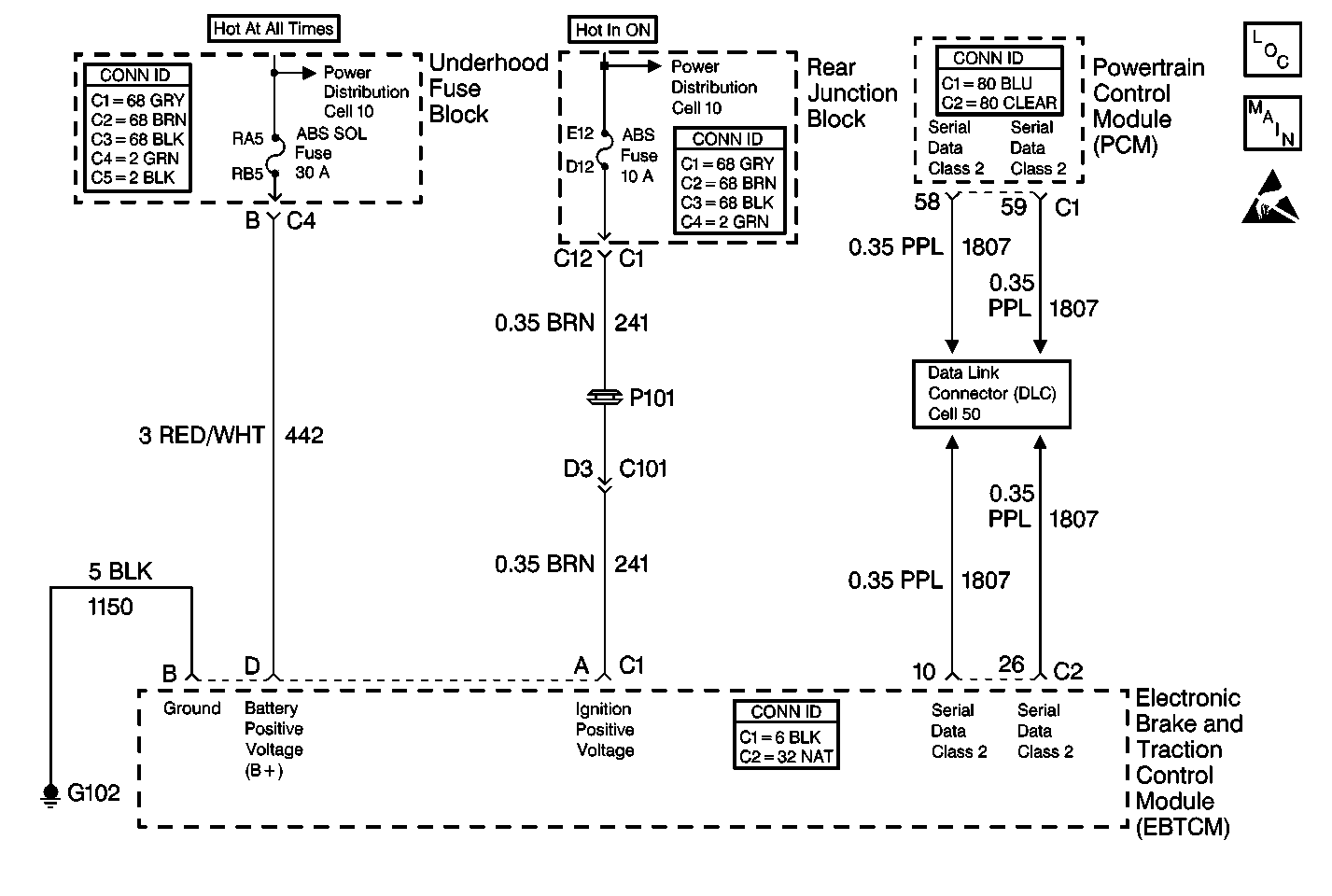
Circuit Description
The class 2 serial data line allows all of the modules on the line to transmit information to each other as needed. Each module is assigned an ID. All of the information sent out on the line is assigned a priority by which it is received. When the ignition is turned ON, each module begins to send and receive information. Each module on the class 2 serial data line knows what information the module needs to send out and what information the module should be receiving. What the modules do not know is which module is supposed to send the information. This information is only learned after the module has received the information needed along with the ID of the module that sent the information. This information is then remembered until the ignition switch is turned off.
Diagnostic Aids
| • | It is very important that a thorough inspection of the wiring and connectors be performed. Failure to carefully and fully inspect wiring and connectors may result in misdiagnosis, causing part replacement with reappearance of the malfunction. |
| • | An intermittent malfunction can be caused by poor connections, broken insulation, or a wire that is broken inside the insulation. |
| • | If an intermittent malfunction exists, refer to Intermittents and Poor Connections Diagnosis in Wiring Systems. |
Step | Action | Value(s) | Yes | No |
|---|---|---|---|---|
DEFINITION: The scan tool does not communicate with the EBTCM. | ||||
1 | Did you perform the ABS Diagnostic System Check? | -- | Go to Step 2 | |
2 |
Does the scan tool communicate with any other modules on the serial data class 2? | -- | Go to Step 3 | Go to Diagnostic System Check - Data Link Communications in Data Link Communications. |
3 | Inspect the rear fuse block ABS Fuse. Is the fuse good? | -- | Go to Step 4 | Go to Step 9 |
4 | Inspect the underhood fuse block ABS SOL Fuse. Is the fuse good? | -- | Go to Step 12 | Go to Step 5 |
5 |
Is the fuse good? | -- | Go to Step 6 | |
6 |
Is the resistance within the specified range? | OL (Infinite) | Go to Step 7 | Go to Step 8 |
7 | Replace the EBTCM. Refer to Electronic Brake Control Module Replacement . Did you complete the repair? | -- | -- | |
8 | Repair the short to ground in CKT 442. Refer to Wiring Repairs in Wiring Systems. Did you complete the repair? | -- | -- | |
9 |
Is the fuse good? | -- | Go to Step 10 | |
10 |
Is the resistance within the specified range? | OL (Infinite) | Go to Step 7 | Go to Step 11 |
11 | Repair the short to ground in CKT 241. Refer to Wiring Repairs in Wiring Systems. Did you complete the repair? | -- | -- | |
12 |
Is the voltage within the specified range? | Battery Voltage | Go to Step 13 | Go to Wiring Repairs in Wiring Systems |
13 | Use a J 39200 DMM in order to measure the voltage at the ABS SOL Fuse by probing between the fuse test terminals and a good ground. Is the voltage within the specified range? | Battery Voltage | Go to Step 14 | Go to Wiring Repairs in Wiring Systems |
14 |
Is the resistance less than the specified value? | 2 ohms | Go to Step 16 | Go to Step 15 |
15 | Repair the open in CKT 1150 or G102. Refer to Wiring Repairs in Wiring Systems. Did you complete the repair? | -- | -- | |
16 |
Is the voltage within the specified range? | Battery Voltage | Go to Step 18 | Go to Step 17 |
17 | Repair the open in CKT 241. Refer to Wiring Repairs in Wiring Systems. Did you complete the repair? | -- | -- | |
18 | Use a J 39200 DMM in order to measure the voltage between the J 39700 terminal D and terminal B. Is the voltage within the specified range? | Battery Voltage | Go to Step 7 | Go to Step 19 |
19 | Repair the open in CKT 442. Refer to Wiring Repairs in Wiring Systems. Did you complete the repair? | -- | -- | |
